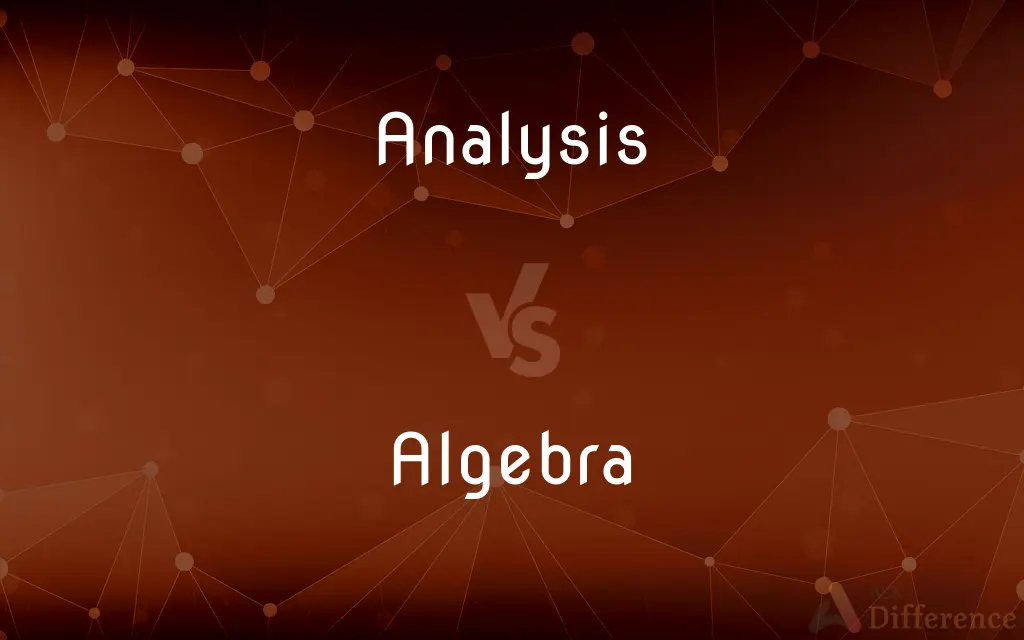Analysis vs. Algebra — What's the Difference?
Edited by Tayyaba Rehman — By Maham Liaqat — Updated on April 15, 2024
Analysis focuses on understanding change and continuous processes, whereas algebra deals with structures and abstract equations.

Difference Between Analysis and Algebra
Table of Contents
ADVERTISEMENT
Key Differences
Analysis primarily studies change, limits, and functions, particularly in the context of calculus and real numbers. In contrast, algebra is concerned with mathematical symbols and the rules for manipulating these symbols.
In analysis, concepts like continuity, derivatives, and integrals are fundamental, used to explore and solve problems involving rates of change and accumulation. Whereas algebra involves operations and relationships in abstract spaces, including solving equations and understanding algebraic structures like groups, rings, and fields.
Analytical methods are crucial in scientific fields that require precise formulations of rates of change and approximation methods, such as physics and engineering. On the other hand, algebraic techniques are foundational in areas requiring structural problem-solving and abstract reasoning, such as computer science and cryptography.
Real analysis, a subset of analysis, delves into the properties of real numbers, continuity, and convergence. Meanwhile, algebra includes linear algebra, which explores vectors, matrices, and linear transformations.
Analysis often uses a step-by-step approach to reach conclusions, heavily relying on the concepts of infinitesimals and convergence. Algebra, however, frequently employs systematic problem-solving techniques and formulas to handle general cases and structures.
ADVERTISEMENT
Comparison Chart
Focus
Change, continuity, and limits
Structures, equations, and logic
Primary Concepts
Derivatives, integrals, series
Groups, rings, fields, equations
Application Fields
Physics, engineering, economics
Cryptography, computing, theory
Subfields
Real analysis, complex analysis, differential equations
Linear algebra, abstract algebra, Boolean algebra
Methods
Calculative, approaching via limits
Symbolic, structural manipulation
Compare with Definitions
Analysis
The study of the processes of calculating derivatives and integrals of functions.
Analysis is used to determine the maximum rate of change in cost functions.
Algebra
The part of mathematics in which letters and other general symbols are used to represent numbers and quantities in formulae and equations.
Algebra simplifies the representation of complex calculations.
Analysis
A branch of mathematics focusing on sequences, series, and their convergence.
Fourier analysis deals with expressing functions as a sum of sine and cosine terms.
Algebra
A tool for solving problems with unknown variables.
Algebra is essential for solving quadratic equations.
Analysis
Utilized to solve problems in real-world applications involving continuous variables.
Environmental scientists use analysis to model temperature changes.
Algebra
Essential for developing algorithms in computer science and cryptography.
Algebraic structures are used to secure data encryption methods.
Analysis
Involves studying mathematical concepts approaching infinitely small scales.
Analysis often examines how functions behave near points of interest.
Algebra
Involves the study of mathematical symbols and the rules for manipulating these symbols.
Abstract algebra explores the structures such as groups and rings.
Analysis
Examines detailed methods for approximating solutions to complex problems.
Numerical analysis provides methods to approximate solutions of differential equations.
Algebra
Covers various types, including elementary, abstract, and linear algebra.
Linear algebra focuses on vector spaces and linear mappings.
Analysis
Analysis is the process of breaking a complex topic or substance into smaller parts in order to gain a better understanding of it. The technique has been applied in the study of mathematics and logic since before Aristotle (384–322 B.C.), though analysis as a formal concept is a relatively recent development.The word comes from the Ancient Greek ἀνάλυσις (analysis, "a breaking-up" or "an untying;" from ana- "up, throughout" and lysis "a loosening").
Algebra
Algebra (from Arabic: الجبر, romanized: al-jabr, lit. 'reunion of broken parts, bonesetting') is one of the broad areas of mathematics, together with number theory, geometry and analysis. In its most general form, algebra is the study of mathematical symbols and the rules for manipulating these symbols; it is a unifying thread of almost all of mathematics.
Analysis
Detailed examination of the elements or structure of something
Statistical analysis
An analysis of popular culture
Algebra
A branch of mathematics in which symbols, usually letters of the alphabet, represent numbers or members of a specified set and are used to represent quantities and to express general relationships that hold for all members of the set.
Analysis
Short for psychoanalysis
Other schools of analysis have evolved out of the original disciplines established by Freud
Algebra
A set together with a pair of binary operations defined on the set. Usually, the set and the operations simultaneously form both a ring and a module.
Analysis
The separation of an intellectual or material whole into its constituent parts for individual study.
Algebra
A system for computation using letters or other symbols to represent numbers, with rules for manipulating these symbols.
Analysis
The study of such constituent parts and their interrelationships in making up a whole.
Algebra
The surgical treatment of a dislocated or fractured bone. Also (countable): a dislocation or fracture.
Analysis
A spoken or written presentation of such study
Published an analysis of poetic meter.
Algebra
The study of algebraic structures.
Analysis
The separation of a substance into its constituent elements to determine either their nature (qualitative analysis) or their proportions (quantitative analysis).
Algebra
A universal algebra.
Analysis
The stated findings of such a separation or determination.
Algebra
An algebraic structure consisting of a module over a commutative ring (or a vector space over a field) along with an additional binary operation that is bilinear over module (or vector) addition and scalar multiplication.
Analysis
A branch of mathematics principally involving differential and integral calculus, sequences, and series and concerned with limits and convergence.
Algebra
A collection of subsets of a given set, such that this collection contains the empty set, and the collection is closed under unions and complements (and thereby also under intersections and differences).
Analysis
The method of proof in which a known truth is sought as a consequence of a series of deductions from that which is the thing to be proved.
Algebra
One of several other types of mathematical structure.
Analysis
(Linguistics) The use of function words such as prepositions, pronouns, or auxiliary verbs instead of inflectional endings to express a grammatical relationship; for example, the cover of the dictionary instead of the dictionary's cover.
Algebra
(figurative) A system or process, that is like algebra by substituting one thing for another, or in using signs, symbols, etc., to represent concepts or ideas.
Analysis
Psychoanalysis.
Algebra
That branch of mathematics which treats of the relations and properties of quantity by means of letters and other symbols. It is applicable to those relations that are true of every kind of magnitude.
Analysis
Systems analysis.
Algebra
A treatise on this science.
Analysis
(countable) Decomposition into components in order to study (a complex thing, concept, theory etc.).
Algebra
The mathematics of generalized arithmetical operations
Analysis
(countable) The result of such a process.
Analysis
The mathematical study of functions, sequences, series, limits, derivatives and integrals.
Mathematical analysis
Analysis
Proof by deduction from known truths.
Analysis
The process of breaking down a substance into its constituent parts, or the result of this process.
Analysis
The analytical study of melodies, harmonies, sequences, repetitions, variations, quotations, juxtapositions, and surprises.
Analysis
Psychoanalysis.
Analysis
A resolution of anything, whether an object of the senses or of the intellect, into its constituent or original elements; an examination of the component parts of a subject, each separately, as the words which compose a sentence, the tones of a tune, or the simple propositions which enter into an argument. It is opposed to synthesis.
Analysis
The separation of a compound substance, by chemical processes, into its constituents, with a view to ascertain either (a) what elements it contains, or (b) how much of each element is present. The former is called qualitative, and the latter quantitative analysis.
Analysis
The tracing of things to their source, and the resolving of knowledge into its original principles.
Analysis
The resolving of problems by reducing the conditions that are in them to equations.
Analysis
A syllabus, or table of the principal heads of a discourse, disposed in their natural order.
Analysis
The process of ascertaining the name of a species, or its place in a system of classification, by means of an analytical table or key.
Analysis
An investigation of the component parts of a whole and their relations in making up the whole
Analysis
The abstract separation of a whole into its constituent parts in order to study the parts and their relations
Analysis
A form of literary criticism in which the structure of a piece of writing is analyzed
Analysis
The use of closed-class words instead of inflections: e.g., `the father of the bride' instead of `the bride's father'
Analysis
A branch of mathematics involving calculus and the theory of limits; sequences and series and integration and differentiation
Analysis
A set of techniques for exploring underlying motives and a method of treating various mental disorders; based on the theories of Sigmund Freud;
His physician recommended psychoanalysis
Common Curiosities
How do analysis and algebra apply to computer science?
Analysis is used in algorithm efficiency evaluation, while algebra is crucial in algorithm design and cryptography.
What is the main focus of analysis?
Analysis focuses on processes involving change and continuity, such as derivatives and integrals.
How is algebra different from analysis in terms of primary concepts?
Algebra deals with abstract structures and symbolic manipulations, unlike analysis which focuses on continuous processes.
What are some subfields of algebra?
Some subfields include linear algebra, abstract algebra, and Boolean algebra.
What is abstract algebra?
Abstract algebra studies algebraic structures like groups, rings, and fields.
How does analysis handle real-world problems?
Analysis provides tools to model and solve problems involving continuous change and phenomena.
Can you give an example of how analysis is used in physics?
Analysis is used in physics to model phenomena like motion under the influence of forces.
How do analysis and algebra complement each other?
They complement each other by combining continuous and discrete mathematical approaches to solve complex problems.
What is the importance of linear algebra?
Linear algebra is vital for solving systems of linear equations and in computer graphics.
What is real analysis?
Real analysis studies the properties of real numbers, sequences, and functions.
How does analysis contribute to environmental science?
Analysis helps in modeling environmental systems and predicting changes.
What are some practical applications of linear algebra?
Linear algebra is used in areas ranging from engineering to economics for dealing with vector spaces and transformations.
What role does algebra play in cryptography?
Algebra provides the mathematical foundation for constructing and analyzing encryption algorithms.
What is differential equations in analysis?
Differential equations involve functions and their derivatives, used to model dynamic systems.
Can algebra be used in economics?
Yes, algebra is used in economics to model economic theories and solve equations.
Share Your Discovery

Previous Comparison
Explorer vs. Traveller
Next Comparison
Philosophy vs. MetaphysicsAuthor Spotlight
Written by
Maham LiaqatEdited by
Tayyaba RehmanTayyaba Rehman is a distinguished writer, currently serving as a primary contributor to askdifference.com. As a researcher in semantics and etymology, Tayyaba's passion for the complexity of languages and their distinctions has found a perfect home on the platform. Tayyaba delves into the intricacies of language, distinguishing between commonly confused words and phrases, thereby providing clarity for readers worldwide.
















































